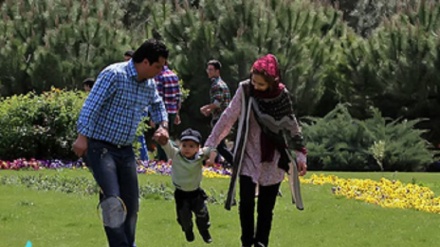Iranian Family (45)
Welcome to this week's episode of the series "Iranian Family". Nowadays, parents make every effort to provide welfare and comfort for their children.
Meanwhile, the important point is that parents, in addition to paying attention to the appearance and possible physical discomforts of their children, should highly invest in the ethics and spiritual upbringing of their children, given that children are highly and quickly influenced by the measures taken, and guidance of their parents and teachers.
The First Infallible Imam of the Prophet of Islam's Household, Imam Ali (AS) has reminded the duty of children's upbringing, which is delegated on parents. Parents should understand their children, prior to children being influenced by their living environment and conditions; and should meet and provide for their children's spiritual and emotional needs, while directing them toward the divine righteous path. We pointed out that the child's characteristic traits are directly influenced by parents' behavioral patterns and via interactions with his parents. The healthy growth and development of the child's character, and his potential for success in different fields and domains are directly tied to the familial communication models. Parents should focus on factors which contribute to building the characteristic traits of their children, and should be precise and sensitive toward what they should provide for, and what they should teach to their children. Furthermore, they should recognize the physical and psychological features of their children in order to prepare appropriate educational plans for them.
Significant importance is attached to the parameters and factors which contribute to shaping the character of children. One of the most important factors is to pay attention to the spiritual and psychological needs of children. The child needs to establish and maintain amicable and kind relations. If this need is not met, the child feels a sense of loneliness. The child needs to feel being important. Determination of house chores for children, compatible with their physical, and mental abilities enables them to sense their role and contribution to the progress of the family.
Children learn skills based on the role models that are presented to them. The best way to learn skills is via imitation, and through positive reinforcement of the related skills. The sense of sympathy, establishment and maintenance of interpersonal relationships, self-restraint, and the ability to make the right decisions are some of the life skills which parents should teach their children.
According to psychologists, in the first seven years of the child's life; expression of kindness plays a decisive and vital role in the success and appropriate formation of the child's character. Meanwhile, in order to fulfill this task, especial attention should be given to the child's upbringing. The Prophet of Islam, Mohammad (Blessings of God upon him and his progeny) invited parents to be kind and to get along with their children. The child feels a strong need to play and to be cheerful in the first seven years of his life.
Psychologists point out that children, via playing games, grow and develop physically and mentally, and become prepared to deal with potential problems. Meanwhile, parents, via participation in their child's games, can teach many social rules, values, and norms to their children.
In the second phase of the child's life, which is referred to as the phase of obedience, the child experiences a swift mental growth, enabling him to solve his problems via contemplation and trial and error. According to teachers, this phase marks the best period for the commencement of education of children. In this period of time, parents' behavior should be in a manner which would gradually encourage the child toward obedience. In this phase of child's life; in addition to family, other educational organizations, namely schools and social and religious organizations teach the child his different responsibilities and roles, and prepare him for his years of adolescence.
The third phase of the child's life is his teenage years from the age of 14 to the age of 21. In the view of psychologists, this phase in the child's life is coupled with a possible identity crisis, and is concurrent with the process of puberty which is one of the most critical periods of life of any given individual. In the meantime, in this phase of the individual's life, he develops an interest in independence, selection of his job, acceptance of responsibility, and perception of ethical and spiritual values, in addition to religious and ethical beliefs. Hence, the teenager's growing and developing characteristic traits should be respected and honored and he should be allowed to present his suggestions and recommendations in different matters of life. In this phase, the teenager feels that he has grown up, while seeking independence, and resenting anything which would restrict and limit his power. The teenager dreams about his golden aspirations and does not show any interest as such in meeting his actual needs in life. Hence, the teenager is in need of consultation in order to guide him toward an independent character, and to immune and safeguard him from derailment from the righteous path.
MR/ME


